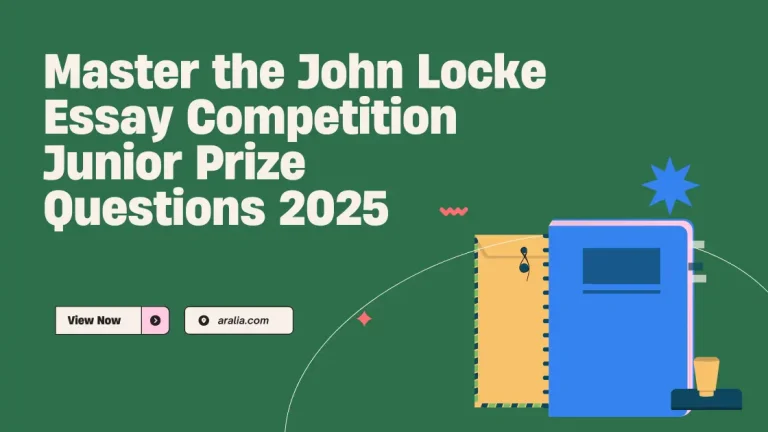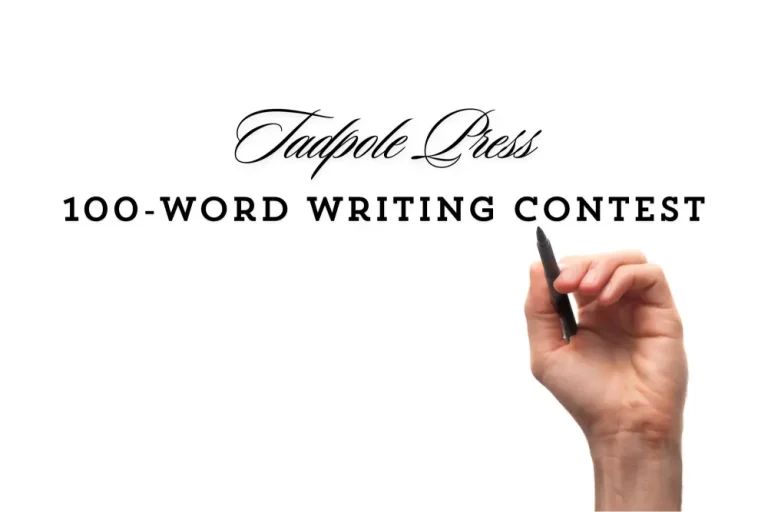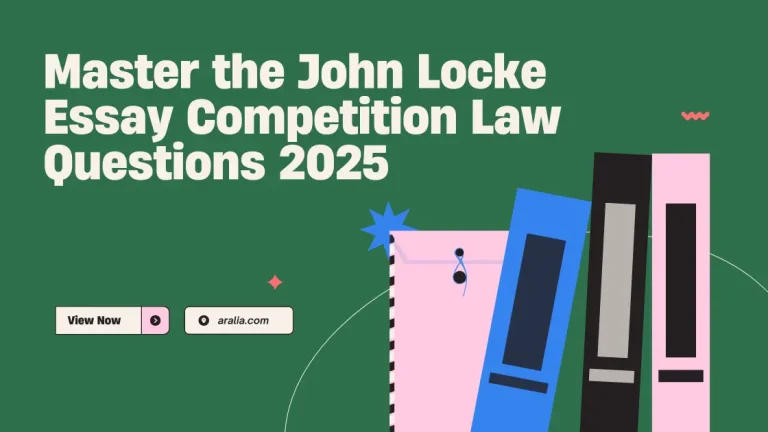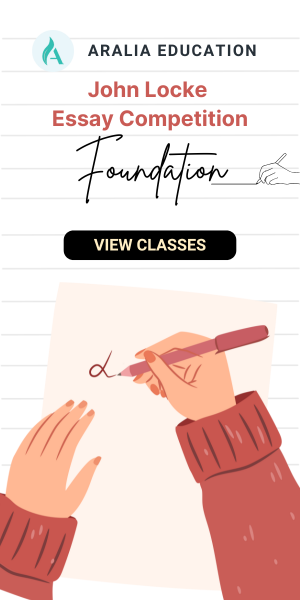New Topics, Extended Deadlines, and Key Changes from 2024
78% of Aralia Students Win Prizes in the John Locke Essay Competition
Q1. Do we have any good reasons to trust our moral intuition?
Q2. Do girls have a (moral) right to compete in sporting contests that exclude boys?
Q3. Should I be held responsible for what I believe?
Q1. Do we have any good reasons to trust our moral intuition?
The question “Do we have any good reasons to trust our moral intuition?” delves into the fundamental basis of moral decision-making and the validity of relying on intuitive moral judgments. Students first need to understand what moral intuition is and be able to explain that in detail.
After establishing the foundation of moral intuition, it’s recommended that students explore the significance of moral intuition in moral cognition and decision-making. How does moral intuition contribute to our understanding of right and wrong? What role does it play in shaping individual and collective moral behavior?
The next step that would help guide students in answering the question is to verify the rationale behind placing trust in our moral intuition. Are there evolutionary, psychological, or philosophical arguments that justify relying on moral intuition as a reliable guide for ethical judgments? How do cultural, emotional, and reflective factors influence the credibility of moral intuitions?
However, establishing the credibility of moral intuition requires scrutiny. What constitutes a “good reason” to trust our moral intuitions, and how do we differentiate genuine intuitions from biases or cultural influences? Exploring alternative approaches to moral decision-making offers insights into contrasting methodologies and their implications for moral discourse.
Q2. Do girls have a (moral) right to compete in sporting contests that exclude boys?
This is a multi-faceted question with different parts that we can dissect. The first step is setting the foundation. Begin by examining the concept of moral rights and their relevance in the context of sports.
Additionally, it may be a worthwhile endeavor to examine the definitions of gender, and how we differentiate between girls and boys, especially when it comes to sports. Are these means of differentiation morally or scientifically sound? Why do they exist, and do they exist for valid reasons? It could also be relevant to consider the inclusion of trans athletes in particular gendered groups, both as edge cases to these qualifications, and because of the highly morally charged dialogue surrounding this issue.
Secondly, delve into the spectrum of moral rights, distinguishing between positive rights, which entail entitlements to receive certain goods or services, and negative rights, which involve freedoms from interference or coercion. How do these moral rights manifest in the realm of sports, particularly concerning gender inclusion? What ethical considerations arise when balancing the rights of athletes?
Q3. Should I be held responsible for what I believe?
This question gives students an opportunity to explore a huge range of issues. It is first important to start by defining both beliefs and responsibility within the context of philosophy.
Then, there are various areas that students may consider exploring when considering our responsibility for beliefs. For example, students could explore the multifaceted idea of moral responsibility—do we make our own choices utilizing free will, or are our choices determined by some external factor(s) like the past and laws of physics? Regardless, what are the implications of moral responsibility, and what things must be true to require us to have this responsibility? And, if we don’t have moral responsibility, what are the implications of that?
Additionally, student could take an epistemological view of this topic by considering what constitutes a belief. How do we form beliefs and how do they impact or influence our knowledge? How do we know things, and what constitutes a justified, true belief? Do things like contradictions in our beliefs impact our responsibility over them? Especially because John Locke is considered to be a prominent empiricist, this may be a particularly interesting topic to explore.
Students could also consider this question from a more cognitive angle, analyzing bias and the ways that external factors impact our beliefs. What are the ethics of belief? Are we responsible for what we believe, or just how our beliefs manifest and impact others?
Overall, students should take the time to discuss the ethical implications of whether or not we have responsibility for what we believe. Lastly, how do we hold people responsible for their beliefs in society today?
Some other interesting questions students can ask throughout this process are: What power do we have over belief formation? How does freedom affect responsibility?
2. Some General Tips for Students to Keep in Mind While Writing Their Essay
Analyze the questions and link them to John Locke’s philosophy
Take the time to understand the essay prompt and what the question is asking for. By drawing connections between Locke’s philosophy and the essay prompt, you can provide a nuanced and insightful analysis that demonstrates a deep understanding of both the question and Locke’s ideas. This approach not only showcases your comprehension of the material but also allows you to engage critically with the topic at hand.
Clear reasoning with evidence drawn from extensive research
Once you decide on your stance about the question, it’s important to present your argument with logical reasoning and strong evidence from reputable sources. Students can utilize a variety of sources, including academic journals, books, and scholarly articles to gather relevant information and develop a well-informed argument. In addition, make sure that you have a strong thesis statement and that your structure and ideas are presented clearly, allowing your reader to navigate your essay with ease.
Engage in critical analysis
In addition to providing reasoning and evidence that support students’ arguments, students should also examine alternative perspectives to show that they have the ability to evaluate evidence critically– specifically the strengths and weaknesses of different viewpoints. The most important part of an argumentative essay is to answer the question, “so what?” Students should consider the wider implications of their argument, as well as why their audience should deeply care about what they have to say.
Refine Your Writing Style
This type of essay falls under the argumentative essay type. This essay type requires a third-person perspective throughout the introduction, body, and conclusion. Students should also use headings and transitions to create a smooth flow and overview of ideas without providing an excess of information.
Proofreading and Editing
Before submitting your essay and throughout the writing process, always seek feedback from peers and teachers to gain valuable insights and perspectives on your essay to help you make revisions and create the best essay you possibly can.
3. Aralia’s John Locke Competition Prep
In this John Locke Essay Competition Prep course, students will learn the ins and outs of essay writing, in preparation for entering the competition. We offer prep classes in all categories: philosophy, politics, economics, history, psychology, theology, and law. Students will choose one topic, compose an original thesis and argument, and write an essay for submission. Students will engage in a guided analysis of primary and secondary sources, develop critical thinking skills, and discover interesting insights. In addition to the group lecture classes, students will receive guidance on their individual projects from the instructor, in one-on-one sessions.

John Locke Essay Competition Prep
In this John Locke Essay Competition Prep course, students will learn the ins and outs of essay writing, in preparation for entering the competition. We offer prep classes in all categories: philosophy, politics, economics, history, psychology, theology, and law. Students will choose one topic, compose an original thesis and argument, and write an essay for submission. Students will engage in a guided analysis of primary and secondary sources, develop critical thinking skills, and discover interesting insights. In addition to the group lecture classes, students will receive guidance on their individual projects from the instructor, in one-on-one sessions.










